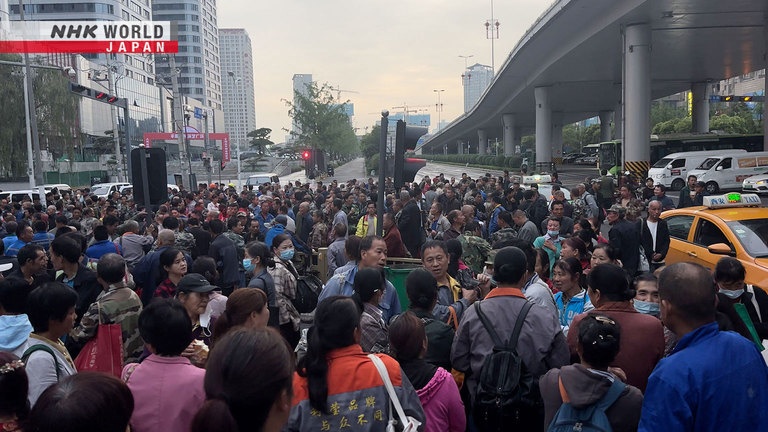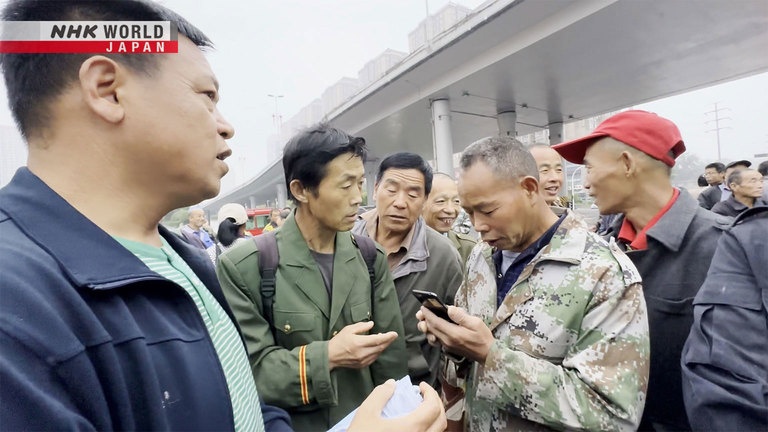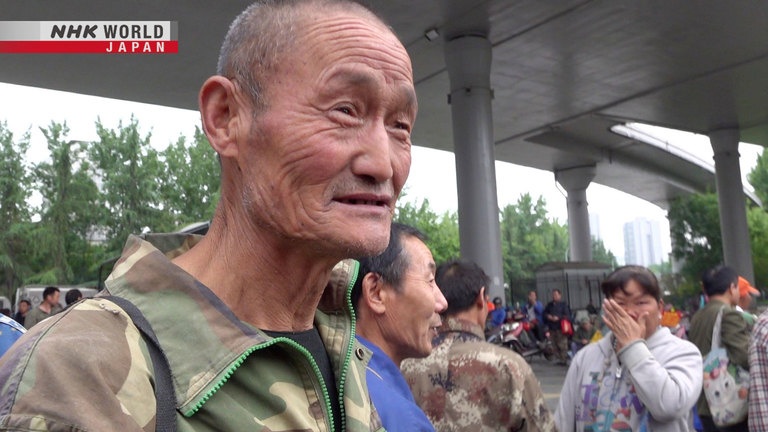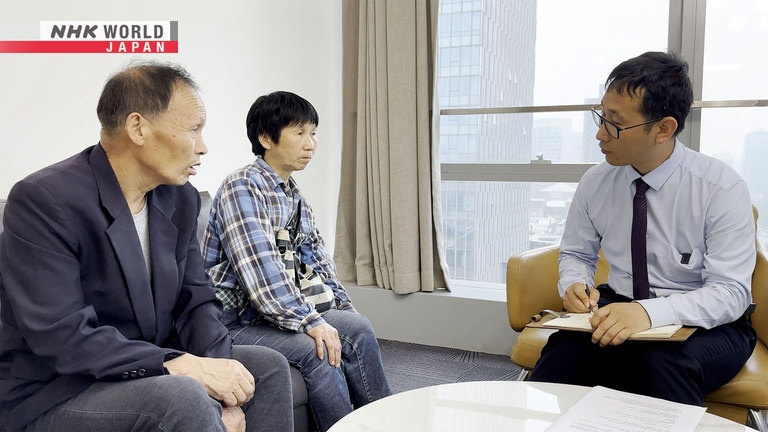Struggling Elderly Migrant Workers: Xi'an, China
The Banpo Labor Market located in the city of Xi'an was once known as a prime location for recruiting laborers. Now, almost all those who gather to find work are in their 50s or 60s. But to prevent construction site accidents, some major cities are passing ordinances that forbid the employment of people 60 or older. Migrant workers who need to sustain themselves accept jobs out of contract, and disputes are frequent. In this episode, we meet the workers who once fueled China's economic growth, but are now being left in the dust.




Transcript
Xi'an, the northwestern city that was once the ancient capital of China,
is being developed as the start of the One Belt One Road Initiative's land route.
The population has increased by 4.5 million growth in the last decade.
To a total of 13 million.
Laborers from nearby regions gather at this huge, inland base.
The Banpo Labor Market is on the outskirts of Xi'an City.
Every morning, it's crowded with people seeking day labor jobs.
Hundreds of people can be seen gathering here on any given day, but none among them are young.
Most are over the age of 50.
I can't possibly live on my pension
of just US$27 a month.
I need to work to survive.
There are no decent jobs for people over 60.
That's why we come here for work.
To prevent construction site accidents, some major cities are passing ordinances that forbid the employment of people over 60.
But many seniors want to work all the same.
Without proper contracts signed, disputes are frequent.
Please pay her in full.
- I can't.
- Why not?
He hung up.
Migrant workers from rural China supported the country's economic growth at its roots.
This episode introduces the people who have been locked out of the wealth that they helped create.
The Banpo Labor Market opened some 20 years ago, when China had been called "the Factory of the World."
Inland areas like Xi'an began to be developed following the rise of coastal cities like Shanghai.
At its peak, more than 3,000 young people gathered here before dawn, giving Banpo a reputation as the largest labor market in inland China.
People who come here seek day labor jobs at construction sites and factories.
Currently around 500 arrive here early each morning.
Most of the prospective workers are in their 50s and 60s.
These people were the first who left rural areas for cities during the Open-Door Reform Policy, which boosted the Chinese economy.
Around 6 o'clock, coordinators come around seeking laborers.
People instantly flock to them.
Can anyone repair electric facilities?
Of course, I can.
- What kind of work?
- Just basic labor.
- Take me, too.
- It's $25 a day.
A car had stopped in the middle of the street in some sort of altercation.
Hey! There's an age limit.
Get off! We don't need that many.
- Why did you get taken off?
- Do you have to ask?
For small jobs, they only take the young.
If there's lots of work, they'll take anyone.
Around 15 coordinators came today, but less than 100 people got work.
There's also a government-approved employment agency at the labor market.
The jobs introduced here offer conditions set by law regarding work hours, payment and benefits.
Contracts are always signed between laborers and employers, be they long or short-term jobs.
But manual labor such as construction work isn't popular among young people, so they're using social media to attract younger workers.
We input job data.
And send them to a WeChat group.
- Are these for day laborers?
- Yes. We offer one-day jobs and long-term work.
The job is cleaning machines.
It pays $25 a day.
It's a day job, not a night shift.
There's a dormitory.
There are meal and housing benefits.
What kind of people are applying?
This person is from the suburbs.
He's coming later.
- How old is he?
- 37.
Are there many elderly laborers
seeking jobs here?
Not many. The jobs we introduce are mostly
long-term. They often have age limits.
Employers avoid hiring older workers.
Workers over 60 pose the most
risk for workers.
It's because we can't enroll them
In workers' compensation insurance.
In China, it's difficult for workers over 60 to be enrolled in compensation insurance.
The average retirement age in the country is 60 for men and 50 for women.
But this doesn't apply to migrant workers, who often have to keep working, since they receive only 1/20th the pension of contract employees.
- We'll be going by bike soon.
- How many people do you need?
- What type of work?
- Picking up trash.
- How many were they seeking?
- Just one.
Why didn't you go?
It was too much competition
for a $25 job.
68-year-old Kang Genchang moved away from his village in Shaanxi Province in the 1980s to work in the city.
He returned to his hometown later in life, but resumed day labor about five years ago in order to repay a debt.
- How long have you been looking?
- For a month, but no luck.
I come here every day,
but no one hires me.
Kang is proud of having raised three children with his hard-earned wages.
He managed to send his son to college.
By 7 a.m. when construction work begins, fewer coordinators are left.
But many job-seekers remain in the area, refusing to give up.
Kang waits until 8 a.m.
Still unable to find work, he returns home.
Currently, he and his wife stay with their daughter's family.
His daughter and her husband both work.
Kang's wife takes care of their 3-year-old daughter while they're away.
Feeding 5 people isn't cheap, so Kang tries to help out with living expenses when he can find work.
How much is rent?
$165 a month.
My daughter pays for it.
How much is your pension?
It was $19 a month. Now it's $21.
It's ridiculous. I can't afford anything.
The Open-Door Reform Policy began in the 1980s.
The introduction of the market economy propelled China to become the second-largest economy in the world.
The vast amount of labor from the countryside was a huge engine behind this growth.
These laborers worked at low wages to build roads, buildings and work in factories.
Kang and his wife Liu Lan joined the bandwagon hoping to share in that abundance.
I worked so hard. Manual labor at
construction sites was tough.
I laid tens of thousands of bricks.
I worked twice as much as others.
Taking huge scoops of ashes,
pouring cement, and hauling it.
As hard as life in the city was, they believed that if their children received a good education, the next generation would be better off.
When their children left home, Kang and his wife decided to return to their village with what little savings they had.
But then, their only son suffered a tragic accident.
You never know what'll happen.
Our son almost died in a terrible accident.
My husband wasn't here, so I called the
ambulance and went to the hospital.
Medical bills were around $28,000.
And my son still has the aftereffects.
It made an impact on his life.
I borrowed money from relatives.
Now I have to work to pay them back.
I'm 68. I have to work while I can still move.
- And if you can't work anymore?
- Just got to keep going.
I'll think about it when that time comes.
After the son they had given their all to raising was injured, Kang went back to Xi'an as a day laborer.
The age limit is meant to ensure worker safety.
The contracts are intended to protect workers' rights.
However, some people have no choice but to work outside those realms to survive.
One day laborer also works as a coordinator.
Su Zhongliang is 62.
- What kind of construction site is it today?
- I don't know.
Nothing's set yet.
It might be a rooftop. They'll decide.
Su has worked in Xi'an for more than 30 years.
Having many contacts in the construction field, he became a coordinator.
He actively gives work to people of advanced age.
You look so young.
No grey hairs.
He's fit, too.
- Are you really 62?
- Sure am.
- And how old are you?
- I'm older than he is.
He's older than me.
The group took the subway to a district an hour away.
Su asked the employers to hire as many workers as they could in exchange for not requesting transportation fees.
Today's job is setting up power cables in a building.
It'll take some climbing to accomplish.
Did you put it up? Do it well.
These men all lived through the same eras together as day laborers.
Su checks each worker's safety harness.
Let me show you.
Wrap the rope around your waist.
They work from 8 a.m. to 6 p.m. with breaks in the morning and afternoon, plus a one-hour lunch break.
The daily wage is $21.
Come their morning break, some of them already look tired.
After age 60, construction jobs
are hard to get.
But some places still hire us.
No one gives us insurance, though.
Why can't we rest at age 60 or 70?
Our kids have mortgages in the city.
We work all our lives but
end up with no money.
It's nice to say that we have work.
But in reality, we're begging to stay alive.
It's not just us.
All migrant workers face this.
It's the same all over China.
China's current status as an economic giant feels like a world away for these people.
As many elderly migrant workers face hard times, one lawyer is working to assist them.
Lan Junwei has been offering legal support to the workers for decades.
I'm from a farming village in Gansu Province.
My parents are illiterate.
They were migrant workers when they were young.
Now they take care of my children at home.
I want to assist people like them.
Lan offers pro-bono support for labor disputes encountered by migrant workers, such as payment delays, workers comp, and damages.
An elderly couple in their 60s comes to his office for a consultation.
Please have a seat.
Xu Shuting got work through a coordinator on a one-month job, but received only one-third of the promised wages.
She's been unable to reach the coordinator since.
At first, I called the construction site manager,
and asked to be paid in full.
But I only got partial payment.
$1,200 for the coordinator and I.
I got just $300.
The coordinator took the rest.
They were supposed to get $900 each
for a total of $1800.
The person in charge knows all this.
If that person gets on board, we can solve this.
But right now, it's a one-sided account.
Without the details of the transaction,
I can't make an immediate judgement.
Labor disputes can be complicated when contracts haven't been signed.
Lan first advised Xu to contact the person in charge of the construction.
Contracts are signed for ordinary jobs.
Labor laws are applied.
For stable, long-term jobs that is.
But some jobs, mostly temporary ones,
don't fit into this category.
If a contract is signed, minimum monthly
wage in Xi'an is $300.
Without it, labor laws don't apply.
If both sides agree, a job could pay just
15 cents a day, or just offer lunch.
Disputes for such jobs are considered civil suits.
Rights aren't protected by labor laws.
That's why their wages and benefits are bad.
The two decide to go home to call the person in charge of the construction site.
Lan instructed them to ask about the coordinator's whereabouts and say they'd been talking to a lawyer.
Xu and her husband live in a house that's a 10-minute walk from the Banpo Labor Market.
Rent is $50 with a shared kitchen and bathroom.
It's the kind of old-fashioned apartment no longer commonly seen in China.
The two of them left their farming village for the city around 30 years ago.
In that day, couples were limited in the number of children they could have by the One Child Policy.
In rural China, couples were allowed two.
Xu got pregnant with a third, their first son.
To avoid persecution, they left their hometown.
In the city, they changed jobs frequently, and began taking on day labor in Banpo eight years ago.
As a result of their many sacrifices, they succeeded in raising their three children.
- Who's this in the photo?
- It's my daughter and granddaughter.
The couple refuse to accept money from their children because they know from experience how costly it is to live in the city.
Their son, now 29 years old, works as a live-in, full-time worker at a factory.
Later, they tell the construction site manager everything their lawyer had instructed them of.
Hello. Are you the construction site manager?
Why can't you send my wife her wages
through the coordinator?
- I can't.
- Why not?
Your wife didn't do her job well.
She didn't polish the building properly.
She's aware of it.
You should've have pointed it out, then.
She knows her own work, doesn't she?
I won't give up until you pay me.
He hung up.
"The number you dialed is out of service."
We can't reach him.
Unable to contact the manager after that, they decided to visit the office directly.
This is the new apartment building that Xu worked on.
It sells around $300,000.
- Excuse me. Is the site manager here?
- No.
When will he be back?
- Who are you?
- I used to work here.
I have an inquiry about wages.
I haven't been able to reach him.
- Is he at lunch?
- Yeah. Everyone is.
- What time should I come back?
- They'll be back after noon.
In the end, the site manager never shows up.
Kang Genchang continues to pay his son's medical bills.
He's been especially upset about a recent issue.
We moved two days ago.
- Why did you move?
- I don't want to get into it.
Are you staying nearby?
I haven't started looking.
I'll start tonight.
I might stay for now.
I might leave town tomorrow.
Kang later explained that the landlord suddenly evicted his family.
He went off to work without saying any more.
Meanwhile, Xu and her husband once again head for the construction site.
They've informed the site manager's superior that they're consulting with a lawyer.
Suddenly, a call comes in from the manager.
I told the coordinator to divide the money.
I'll make sure that she pays you.
The money wasn't just for her.
She said she'd pay each person $600.
$600, right?
That coordinator is the problem.
She's dishonest.
The person in charge says he'll make sure the coordinator will pay for missing wages, but that he can't promise the initially-agreed wages in full.
- Are you going to wait?
- Yes. That's all I can do.
Fighting will only hurt us.
We have to believe the manager.
Currently, there are 86 million migrant workers of age 50 or older in China.
Most are now working without contracts.
Even after decades of labor, their work has no end in sight.